| Wednesday, January 28, 2004 |  |
|
|
|
From Alka Dwivedi, an excerpt from a book "Maverick" by Ricardo Semler, about a Brazilian company that is organized and run in a somewhat unusual manner.When I took over Semco from my father 12 years ago, it was a traditional company in every respect, with a pyramidal structure and a rule for every contingency. But today our factory workers sometimes set their own production quotas and even come in their time to meet them, without prodding from management or overtime pay. They help redesign the products they make and formulate the marketing plans. Their bosses, for their part, can run our business units with extraordinary freedom, determining business strategy without interference from the top brass. They even set their own salaries, with no strings. Then again, everyone will know what they are, since all financial - information at Semco is openly discussed.
Indeed our workers have unlimited access to our books ( and we keep one set). To show we are serious about this, Semco, with the labor unions that represent our workers, developed a course to teach everyone, even messengers and cleaning people, to read balance sheets and cash flow statements.
For truly big decisions, such as buying another company, everyone at Semco gets a vote. A few years ago, when we wanted to relocate a factory, we closed down for a day and everyone piled into buses to inspect three possible new sites. Then the workers decided. Their choice hardly thrilled us, since it was next to a company that was frequently on strike. But while no one in management wanted front row seats to labor-management strife, we moved in anyway. In the lobby of our headquarters, a standard-issue office building with four floors of steel and glass, there is a reception desk but [no] receptionist. That's the first clue that we are different.
We don't have receptionists. We don't think they are necessary, despite all our visitors. We don't have secretaries either, or personal assistants. We don't believe in cluttering the payroll with ungratifying, dead-end jobs. Everyone at Semco, even top managers, fetches guests, stands over photocopiers, send faxes, type letters, and dials the phone. We don't have executive dining rooms and parking is strictly first-come, first-served. It's all part of running a natural business.
At Semco we have stripped away the unnecessary perks and privileges that feed the ego but hurt the balance sheet and distract everyone from the crucial corporate tasks of making, selling, billing and collecting. Our offices don't even have the usual number of walls. Instead, a forest of plans separates the desks, computers and drawing boards in our work areas. The mood is informal: some people wear suits and ties or dresses, others jeans and sneakers. It does not matter. If people want to emulate Thomas Watson and don white button-downs, that's fine. But turtleneck and T-shirts are okay, too. And I want our people to feel free to put their feet on their desks, just like me.
I am pleased to report that more than once a group of Semco executes has been interrupted by people who wanted to use their conference room to hold a birthday party. They use my room in office to hold conferences. Sometimes when I enter in my room, someone was sitting in my chair, using my phone. I have to wait on visitors' sofa for the meeting to get over.
We have a sales manager named Rubin Agater who sits there reading the newspaper hour after hour, not even making a pretence of looking busy. I am sure this mystifies some of our visitors. Most modern managers would not tolerate it. But when a Semco pump on an oil tanker on the other side of the world fails and millions of gallons of oil are about to spill into the sea, Rubin springs into action. He knows everything there is to know about our pumps and how to fix them. That's when he earns his salary. No one cares if he doesn't look busy the rest of the time. Sounds like a fun place to work. And it seems to translate into a productive and profitable company. But it also sounds like a socialist commune. Contradiction? Not necessarily. People are more productive when their opinions and their work makes a difference and they aren't hindered by meaningless bureaucracy. This is an inspiring story, and from I can understand, entirely non-fictional, and one can go and visit the company and find out for oneself.
[ Organization | 2004-01-28 18:53 | | PermaLink ] More >
|
|
| Tuesday, January 27, 2004 |  |
|
|
|
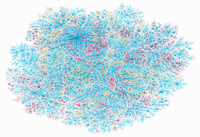 Some words from Bala Pillai: Some words from Bala Pillai:"Imagine a world where each of us can telepathically find and match with our complements instantly. Any moment we have a want or a have.
Call that point downstream, in the flowing river of our and our childrens' lives, "N". Work backwards, upstream, from N. What is N-1?, What is N-2? Let us say N-5= us being able to find and match our complements very quickly using the Internet and through minds that bridge the wired with the unwired. In short N-5 = Halls Without Walls, Metrics-Rich Automated Matchmaking & Human Bridges
What stands in the way of super-conductivity between minds for frictionless synchronization? What are the problems (for which there are rewards to those who solve them), that we have to address to reach N-5? Insentience? Readiness to reveal our complementaries? Knowing what it is that we really want and have? Hierarchy of values dissonance? Semantic dissonance? Cognition dissonance? Valuation (of our respective traits and talents) dissonance? Distrust? Commitment (Unconditional love) dissonance? Ethos dissonance? Interfacing our minds with the tools, protocols and processes that find, search and bridge us with our complements?
How do we swim with the current more, in finding the metrics for the answers, as we head towards N-5?
If we have put Man on the Moon, can't we make it to N-5?
Can we try Ecosystems Thinking? Can we try "reverse engineering" Nature for clues?" His writing is dense, but very inspiring. And I often find myself thinking in similar paths.
A big reason the world isn't working better is that we're having a hard time matching needs with haves. We're bad at connecting resources up with where they would do the most good. It is hard for people to find out who they would accomplish the most by working with. Hard to find *complements*. And the problem is primarily informational. We don't really know. We don't have good information, so we go by crude and artificial constructs, like what is advertised for sale on TV, or who we run into at a party.
To imagine a world where we all had a high level of telepathy is an excellent starting point for a lot of revolutionary possibilities. Lies would no longer have any manipulative value if everybody could see right through them and know the truth without bias. You'd have to really do good things to be seen as doing something valuable. Duh. Same with hypocritical morals. You can't get away with applying different rules to others than what you live by. If you're a smuck, everybody will know it.
And then the point Bala is getting at. If you somehow could perceive directly and instantly what everybody in the world needed and wanted, and what resources were available, there'd of course be no reason to waste time and energy on all the stuff that doesn't fit and doesn't work. If you really KNEW, you'd of course do the things you most want to do, where they make the most difference, and with the people who're most suited and interested in doing it with you. No need to do useless activities in a job you don't like, for a company that produces some junk that people wouldn't really want if they knew what it was and what the alternatives were.
And you'd help others do what they want to do when it is easy for you to do so. If you happened to know your neighbor also needs a bag of sugar from the market and that he's currently busy, you can just bring it for him, instead of you both having to go. If you're done with that book you're reading, you can just toss it to a guy on the street who also want to read it, rather than taking it home and hide it in the garage.
And, yes, maybe we can work towards that kind of world, and maybe ways we can organize ourselves, technologies we might employ, and ways we might think about it can take us a great deal of the way. Even short of a global evolutionary leap that gives us all holographic telepathy and clairvoyance. And, yes, nature probably is one of our best teachers in that. After all, ecosystems quite masterfully manage to ensure that nothing really is wasted, even though it all can seem a bit chaotic. No used paperbacks and nuclear waste gets stacked up forever in nature's ecosystems. Whatever one sector needs might well be a waste product from another sector. Whatever you leave behind probably gets eaten up by something else. And telepathy probably has nothing to do with it, so we ought to easily be able learn from what trees and ants and bacteria are doing. And maybe find better ways of synchronizing our work with less friction.
[ Organization | 2004-01-27 16:44 | | PermaLink ] More >
|
|
| Sunday, January 25, 2004 |  |
|
|
|
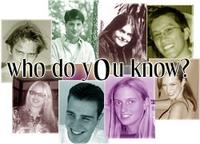 Orkut is a new online social network. And I need another one of those like I need a flowerpot stuck on my head. It is getting a little irritating to go through the same ritual every time, of looking for people you know and inviting others you think might be interested. That should really be automatic. Orkut is a new online social network. And I need another one of those like I need a flowerpot stuck on my head. It is getting a little irritating to go through the same ritual every time, of looking for people you know and inviting others you think might be interested. That should really be automatic.
Most recently I had joined OpenBC, which I like. Has some features I like better than Ryze and not a lot of annoying "You'd actually see the results of this search if you were a GOLD member" messages. And a predominantly European focus. Got some very good contacts out of that already.
And then Orkut is announced Thursday. Interesting phenomenon about how quickly things happen, and how somehow that network happened to right away seem more compelling, even though the features are not all that different from the other ones. For one thing, it is affiliated with Google, done by one of their employees, supposedly in his spare time, so it got a lot of exposure. And then it is by invitation only, which somehow makes it seem a slight bit more attractive, and might make it more likely that one feels obligated to invite all one's friends, so they aren't left out. I got the first invitation at 2AM. And didn't realize right away that the network had started the same day. But now, two days later, *everybody* seems to have joined it already, and it is buzzing with discussion groups and so forth. Well, *everybody* who normally is active in that kind of network. Which is a large group, but still largely the same faces.
In 1995 my vision was to make a network of networks. Social network servers, where people could join the node that they were most attracted to, and there would be a way of linking them all together, so you could find each other even if you didn't join in exactly the same place. Well, I didn't quite figure out how to do that technically, so it became "just" one server with a particular social network. But now that it is a mainstream idea, embraced by a lot of techies, somebody really ought to figure out a way that they'll all interact with each other.
Network connections should be more like a commodity. Like e-mail addresses and accounts. You'll choose a server and a client that has the features you like, but you should really be able to link to people on other servers as easily as on your local server. It should be controlled more by my local address book and preferences than by a particular server. I should be able to find people across all servers, and be able to find the special interest groups they've set up. That'll take adherance to standards. And some new ones are needed for the people networking thing. FOAF seems to be one of the more promising attempts in that direction. We need a set of Open Network standards that all these networks would have a competitive advantage in adhering to.
[ Organization | 2004-01-25 08:13 | | PermaLink ] More >
|
|
| Friday, January 23, 2004 |  |
|
|
|
 From Chris Corrigan: From Chris Corrigan:From Kevin Kelly's blog, comes a review of the book Art and Fear which includes this point:
"The ceramics teacher announced on opening day that he was dividing the class into two groups. All those on the left side of the studio, he said, would be graded solely on the quantity of work they produced, all those on the right solely on its quality. His procedure was simple: on the final day of class he would bring in his bathroom scales and weigh the work of the "quantity" group: fifty pound of pots rated an "A", forty pounds a "B", and so on. Those being graded on "quality," however, needed to produce only one pot -albeit a perfect one - to get an "A". Well, came grading time and a curious fact emerged: the works of highest quality were all produced by the group being graded for quantity. It seems that while the "quantity" group was busily churning out piles of work - and learning from their mistakes - the "quality" group had sat theorizing about perfection, and in the end had little more to show for their efforts than grandiose theories and a pile of dead clay."
Blogging vs. writing books, among many other lessons. Hm, interesting. And business and life in general, I guess. Doesn't pay off very well to be a perfectionist if one holds out for the perfect outcome. But if one puts out a lot of stuff without being too attached to the details AND one has some kind of sense of where it ought to be going, one might actually get somewhere.
[ Organization | 2004-01-23 08:11 | | PermaLink ] More >
|
|
| Thursday, January 22, 2004 |  |
|
|
|
 An old, but very inspiring, article in Fast Company about Fernando Flores and his style of working company executives into thinking and acting their job differently. Fernando Flores was Chile's minister of finance -- and, later, a political prisoner. Now he teaches companies how to use assessments and commitments to transform the way they do business. The outcome: executives who speak and act with intention. An old, but very inspiring, article in Fast Company about Fernando Flores and his style of working company executives into thinking and acting their job differently. Fernando Flores was Chile's minister of finance -- and, later, a political prisoner. Now he teaches companies how to use assessments and commitments to transform the way they do business. The outcome: executives who speak and act with intention.Fernando Flores is pissed off. He has had enough of the bullshit. The 55-year-old philosopher, former Chilean minister of finance, former political prisoner under Augusto Pinochet's rule, has flown halfway around the world, from California to Holland, to transform two executive teams -- 32 leaders in all -- of a global construction giant. These are people accustomed to building on a grand scale. But right now, building is their problem, not their business: Their world-class reputation for being brilliantly managed, it turns out, consists only of hollow words -- words that have little power and less value.
Flores knows about words and how they translate directly into deeds. He knows that talk is never cheap -- he often charges more than $1 million for his services, a fee that is linked directly to specific promises of increased revenues and savings. He also knows that talk is the source of these executives' failure. Their words work against them -- which is why they can't get anything to work for them.
Talk all you want to, Flores says, but if you want to act powerfully, you need to master "speech acts": language rituals that build trust between colleagues and customers, word practices that open your eyes to new possibilities. Speech acts are powerful because most of the actions that people engage in -- in business, in marriage, in parenting -- are carried out through conversation. But most people speak without intention; they simply say whatever comes to mind. Speak with intention, and your actions take on new purpose. Speak with power, and you act with power. Well, read the whole thing. A lot of us could probably use some of his medicine, even if it is doled out a bit hard-handed. The Magic of Transformation as they describe it. Thanks to Bala Pillai for mentioning this one.
[ Organization | 2004-01-22 11:30 | | PermaLink ] More >
|
|
| Thursday, January 15, 2004 |  |
|
|
|
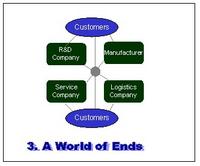 Dave Pollard has a nice piece on The Future of Business. Dave Pollard has a nice piece on The Future of Business.Let's step back now from the perspective of the knowledge worker and look at how the business environment for corporations has changed in 2015. In the early 2000s, large corporations that were once hierarchical end-to-end business enterprises began shedding everything that was not deemed ‘core competency’, in some cases to the point where the only things left were business acumen, market knowledge, experience, decision-making ability, brand name, and aggregation skills. This 'hollowing out' allowed multinationals to achieve enormous leverage and margin. It also made them enormously vulnerable and potentially dispensable.
As outsourcing accelerated, some small companies discovered how to exploit this very vulnerability. When, for example, they identified North American manufacturers outsourcing domestic production to third world plants in the interest of 'increasing productivity', they went directly to the third world manufacturers, offered them a bit more, and then went directly to the North American retailers, and offered to charge them less. The expensive outsourcers quickly found themselves unnecessary middlemen. Now in 2015, the result is what Doc Searls and Dave Weinberger, two Internet experts, have called a World of Ends -- which in its business application means a disintermediated world where specialized businesses contract directly with each other to bring the benefits of globalization and the free market to consumers. The large corporations, having shed everything they thought was non 'core competency', learned to their chagrin that in the connected, information economy, the value of their core competency was much less than the inflated value of their stock, and they have lost much of their market share to new federations of small entrepreneurial businesses. Various forward-looking management gurus, like Tom Peters have been talking about this kind of change in the business and job world for a while. Everything will become more loosely connected and changing faster. No lifetime position in a stable company. Everybody will need to be able to market themselves, and will be likely to work on a succession of projects in the form of virtual companies that come together ad hoc to deal with a certain opportunity and that might well disband right afterwards. The change goes all the way up and down. Everybody has to think like an entrepreneur, constantly learning and looking for new opportunities. Constantly working their network, keeping up their repuation.- Your networks are critical: Your success will depend on who you know, but not necessarily who you know well. Because of a phenomenon known as 'the strength of weak links', your future employer, employees, customers and business partners are all likely to be two or three degrees of separation away from those you know personally. Who your associates know is probably more important, therefore, than who you know directly.
- You need to know how to run a business, from start-up to dissolution. Not the sheltered academic skills of large corporate administration, but the down-and-dirty skills of entrepreneurship, where every decision is make-or-break. Your network can help here, too. You're probably three times as likely to be self-employed or unemployed in 2015, as you are to be an employee of someone else, so you'll need these skills. All of it is of course both scary and exciting. And there are other possibilities of course, but this is quite likely how the capitalistic society is evolving. So, unless something fundamental changes, we'll all have to pay attention. If you'll keep thinking like a good employee you'll be more likely to be expendable and unemployed. If you think like a business person, and you get together a package of goods that the world actually needs - it might all be great. You might have as much chance of succeeding as any multinational company.
[ Organization | 2004-01-15 11:14 | | PermaLink ] More >
|
|
| Saturday, January 10, 2004 |  |
|
|
|
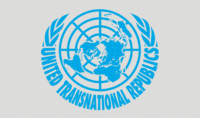 I just discovered and joined the First Transnational Republic. It is a proposed way for individuals to organize, so as to express their freedoms, and to safeguard their needs, on equal terms with transnational corporations and other global players. Here is the manifesto: I just discovered and joined the First Transnational Republic. It is a proposed way for individuals to organize, so as to express their freedoms, and to safeguard their needs, on equal terms with transnational corporations and other global players. Here is the manifesto:Here we are citizens, not subjects.
We, the citizens of the First TRansnational Republic, have assembled in order to globally represent our citizenship rights.
Citizens of our TRansnational Republic are not defined through blood or birthplace but through a similarity in their minds. We therefore ask every person who has an affinity to this and the following principles to join our TRansnational Republic as a free citizen.
The citizen rights include in particular the human rights, transnational principles of justice, the protection of our natural environment as well as the democratic rights of the individual.
In times of growing globalisation the problem of global representation has not yet been sufficiently addressed, the way of the world as well as the faith of the individuals are increasingly determined by transnational organisations (corporations, churches, trade organisations…). There is no comparable political representation system of the individual. The countries of this world cannot – under the influence of these transnational organisations – represent the interests of their citizens; nations cannot act transnationally.
Our aim is the recognition of the First TRansnational Republic by the international community
It seems to be originated in Germany, and, well, there's not a lot there yet. Less than 3000 citizens, and not very many ways of interacting, or an organized way of accomplishing its aims. But what is there looks good, and I like the basic ideas and principles outlined, so I hope there will be a way of participating in fleshing it out further.
[ Organization | 2004-01-10 10:28 | | PermaLink ] More >
|
|
| Tuesday, December 30, 2003 |  |
|
|
|
This site seems to offer a market for software coders and buyers to trade. People who want something done put up a bid request. And I assume they hire the lowest bidder to do the job. That sounds like a great idea. But, looking over the bids, it all looks impossibly low. Like, $10 for solving some problem, or $100 for a redesign of some website. And I see people asking for an airline reservation system that needs to be done the day after tomorrow. I wonder if it works. Maybe it is only school kids who bid, who're thrilled about $100 even if it takes a week to do. Maybe it is people in developing countries doing the work, in which case I think it is great. Doesn't look like I'll find much that will supplement my living in there, though. Maybe I should just put in bid requests for all the work I have to do this month and put the cap at $200, and take the month off myself.
[ Organization | 2003-12-30 16:56 | | PermaLink ] More >
|
|
| Tuesday, December 23, 2003 |  |
|
|
|
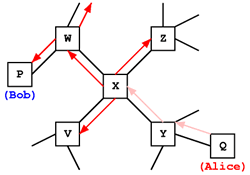 Here's another overview of how ants find food, with the thought towards applying that to program algorithms. It is from MUTE, a new file sharing program. They use a similar, but somewhat improved, approach to decide how best to find a certain user in the network. I fail to see exactly why it would be useful or efficient to do it that way, but there's something there, of course. Generally speaking the thought is that we have a network, similar to a neural network, and it learns how best to find stuff based on the success of past attempts to find it. Which is how it should be, of course. But ants only need to signal where there's food and where the home nest is. It is, despite the simple 'random' approach to mapping it, a rather centralized scheme of organization. The ants are not centrally controlled, but it all revolves around bringing food back to the nest and similar activities. We have potentially billions of pieces of information and billions of places to find it. I'm not sure how we can manage that really well without each node keeping a whole record of everything it has been asked for and where it sent it and where it came back from. Kind of like a google database in each node. But maybe I just don't get it yet. Here's another overview of how ants find food, with the thought towards applying that to program algorithms. It is from MUTE, a new file sharing program. They use a similar, but somewhat improved, approach to decide how best to find a certain user in the network. I fail to see exactly why it would be useful or efficient to do it that way, but there's something there, of course. Generally speaking the thought is that we have a network, similar to a neural network, and it learns how best to find stuff based on the success of past attempts to find it. Which is how it should be, of course. But ants only need to signal where there's food and where the home nest is. It is, despite the simple 'random' approach to mapping it, a rather centralized scheme of organization. The ants are not centrally controlled, but it all revolves around bringing food back to the nest and similar activities. We have potentially billions of pieces of information and billions of places to find it. I'm not sure how we can manage that really well without each node keeping a whole record of everything it has been asked for and where it sent it and where it came back from. Kind of like a google database in each node. But maybe I just don't get it yet.
[ Organization | 2003-12-23 09:15 | 0 comments | PermaLink ]
|
|
| Sunday, December 14, 2003 |  |
|
|
|
Jon Husband talks about Art Kleiner who just wrote a book "Who Really Matters - The Core Group Theory of Power, Privilege and Success". Essentially about how most organizations exist to satisfy not all stakeholders, but a particular, much smaller, core group.DC- What is Core Group Theory all about?
AK- Most employees, even senior executives, find their organization does not behave the way they expect it to. Certainly the organization does not do the things it espouses to do. Organizations are unpredictable. They sometimes seem frustrating. This is because we don't understand what purpose they are really trying to serve.
Organizations are actually a kind of complex living system —which move in the aggregate direction set by all the people, top to bottom, who are making decisions at their levels. Core Group Theory says that, when you put all these decisions together, the net result is that the organization exists to serve some group of “key insiders” who are prominent within it.
When you make a decision you may say to yourself, "Is this going to fit with so-and-so’s priorities?" or "I don’t want to be the one to walk into so-and-so’s office and tell him." It is the perceived interests of this core group that actually drives most decision-making. Very interesting. I think that is correct. And I think that is a glaring problem concerning organizations, particularly corporations. There might be 10s of thousands of people there, but they really all work for a very small group of people. Which isn't necessarily the proper owners or top executives. Big corporations don't necessarily exist just to produce wealth. They exist to satisfy a particular circle of influential people. That important to know about. For one thing because I think that's somehow unfair. For another, if you're trying to make a certain organization work better, you'll have to know that it isn't going to work unless the core group goes along with the proposed direction of change. To transform an organization you'll need to transform the core group. Maybe it isn't a bad thing. Maybe we just need to become better at creating core groups. Like this.
[ Organization | 2003-12-14 11:53 | | PermaLink ] More >
|
|
| Friday, December 5, 2003 |  |
|
|
|
 Tom Atlee wrote a wonderful article about diversity. Tom is always an astute observer and thinker and collector of anything that might possibly help groups of people work better together, and tap their own co-intelligence. Tom Atlee wrote a wonderful article about diversity. Tom is always an astute observer and thinker and collector of anything that might possibly help groups of people work better together, and tap their own co-intelligence.Diversity makes whole systems possible: You need diverse parts to make a bicycle. A barrel of handlebars won't do the job. Likewise, an ecosystem is made up of diverse species, making up complex food chains and cycles that keep the whole thing going.
Relationship, community, interdependence, mutuality -- even the entire economic system with all its different jobs and products and services and forms of exchange -- are all totally dependent on diversity.
As is freedom. Uniqueness is the inside face of diversity. If I want to "be myself" and "do things my way," I have to live in a culture that respects diversity. The more free a society, the more diversity it tends to generate. And that diversity tends to beget even more diversity as diverse people, stimulated by each other, find new ways to be unique...
Diversity is key to resilience. "Diversify," say the investment counsellors. If one variety fails, life can switch to another. This is the principle behind biodiversity: If all our corn is genetically identical, and a virulent bug attacks it, it may all be killed off. If our corn is genetically diverse, then some of it will succumb and some will survive. The survivors will reproduce, resulting in greater resistance to that bug. (Of course this natural selection process is busily at work on the bugs, too, so the dance goes on. But for any given species, its diversity -- and the diversity of the organisms and systems it depends on -- is a vital factor in its survival.)
If everyone depends on one mega-corporation for a monopolized product... If everyone uses the same operating system for their computers... If all the production facilities use the single most efficient form of production... If all the ferries are put out of business so all traffic must go on the bridges... If we all get our electricity from a single grid with no distributed local energy sources.... we make ourselves vulnerable to the collapse of the single things we all depend on. This is what freaked people out about Y2K, that it would knock out some basic central systems, triggering a catastrophic domino effect. This is a nightmare for terrorist emergency response planners, that terrorists could knock out some vital link in some technological system that we all depend on, for which there is no good alternative. Alternatives, diversity -- even redundance -- are key to resilience.
Diversity has many other roles, as well. Perhaps the most important is that it makes synergy dynamic. Three metal bars welded together into a triangle are stronger (more synergistic) than three metal bars welded into any other shape. That's why engineers use steel triangles to build bridges and industrial support structures. But that's static synergy. If you want to see dynamic synergy, check out the conversations between scientists like Albert Einstein and Neils Bohr, or any other people passionate about a subject, who have different views but share a dedication to finding greater truth. Since each sees things from a different perspective, they can see each other's blind spots and evolve together into bigger, clearer ways of seeing the world.
Or you can simply contemplate the synergy between your lungs and your heart, or between oxygen-breathing animals and carbon-dioxide breathing plants, or between musicians in a jazz combo, jamming... The synergy in all these cases is dynamic and alive, thanks to the diverse participants in the dance. There are possible negatives to diversity too, of course. At least apparent negatives. It is usually our differences that we use to oppress each other. So, what do we do about that? How do we focus on the healthy, creative diversity?Ultimately the creative use of diversity involves having some kind of common ground to stand on while exploring difficult differences. One of the most dependable forms of common ground is what I sometimes call our "core commons" -- that place in all of us that is rooted in our shared humanity, our shared aliveness, our shared spirit.
Whether through our own personal development, through good group process (helped perhaps by facilitators or mediators), or through fortunate religious or cultural conditioning, we may be able to see each other through our differences to the depths of our commonality. When this is done in healthy ways, it isn't done to deny our differences, but to maintain heartful, mindful pathways between us as we seek to understand our differences and their role in what comes next. We want our differences to make us powerful partners, not aliens and enemies.
Other forms of common ground include shared goals, visions, values, passions and purposes -- or shared crises that render all other factors miniscule in comparison. Shared history, culture and language can make it much easier to work through differences, as can being together in the same place. Nothing I can add, really. Read the whole article.
[ Organization | 2003-12-05 06:32 | | PermaLink ] More >
|
|
| Tuesday, December 2, 2003 |  |
|
|
|
 An article: "How does IM usage compare to that of other communication media?", describes a study of IM (Instant Messenger) usage. IM is often accused of being a big time waster for employees who sit and chat all day about nothing while they should be working. But that isn't really my experience. To me IM is a very efficient and business-oriented tool. I rarely do smalltalk over IM. But for years I've related with business clients almost exclusively though IM. OK, when I last had a job-job, I used IM for more social stuff, for sending out jokes and so forth. But my experience there too was that it allowed me to better concentrate on work, and that it allowed a social dimension of a workplace to happen at the same time, rather than only in coffee breaks. Anyway, these are some of the findings of the study described in the article: An article: "How does IM usage compare to that of other communication media?", describes a study of IM (Instant Messenger) usage. IM is often accused of being a big time waster for employees who sit and chat all day about nothing while they should be working. But that isn't really my experience. To me IM is a very efficient and business-oriented tool. I rarely do smalltalk over IM. But for years I've related with business clients almost exclusively though IM. OK, when I last had a job-job, I used IM for more social stuff, for sending out jokes and so forth. But my experience there too was that it allowed me to better concentrate on work, and that it allowed a social dimension of a workplace to happen at the same time, rather than only in coffee breaks. Anyway, these are some of the findings of the study described in the article:Although a common impression of IM is that it's used primarily for simple questions and quick clarifications, we found that was true only about 28 percent of the time.
Despite the perception that IM is commonly used for social purposes in the workplace, we found that was rarely the case. Only 13 percent of the conversations we monitored included any personal topics whatsoever, and only 6.4 percent were exclusively personal.
Concerns that IM might distract people from their work proved to be unfounded. The majority of the workplace IM conversations we observed, 62 percent, focused entirely on work-related matters.
Independent of function, we discovered that 23.6 percent of our study group's "conversations" consisted of one person sending one or more messages without getting a response within five minutes. Although this represents a sizeable percentage of the conversations, it's low in comparison to estimates of unanswered phone calls (62 percent) and failed attempts to start impromptu desktop video conferences (75 percent).
Many articles in the popular media and in journals mention that people frequently switch from IM to another form of communication, such as phone or face-to-face, particularly when conversations become complex. We found that media switching was not common, occurring only 16 percent of the time, and they almost never (3 percent) happened because the conversation became too difficult to conduct via text.
Not all of our findings contradicted popular notions of IM use. For example, IM conversations are thought to be quick, and indeed the conversations we monitored lasted about 4.5 minutes. That is also consistent with many other types of impromptu communications (whether face-to-face, over the phone, or by way of desktop video conferencing). Also, IM users are commonly reported to switch frequently between IM conversations and other desktop activities, and we found that to be the case. In 85 percent of the conversations, at least one user multitasked during the IM interaction. But perhaps surprisingly, only 23 percent of users carried on multiple simultaneous IM sessions—and only infrequently at that.
[ Organization | 2003-12-02 11:30 | | PermaLink ] More >
|
|
| Sunday, November 9, 2003 |  |
|
|
|
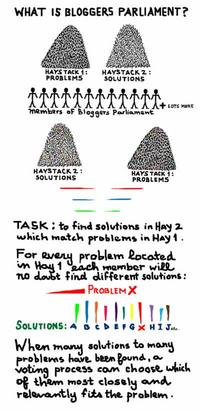 Natalie d'Arbeloff (see also her alter ego Blaugustine's Blog) has started the Blogger's Parliament. And what is that? Natalie d'Arbeloff (see also her alter ego Blaugustine's Blog) has started the Blogger's Parliament. And what is that?"A flexible assembly of bloggers who are interested in finding and selecting from the blogosphere or from any other source - including their own thoughts - feasible solutions to current problems in the world. Members of Bloggers Parliament can be thought of as talent scouts, finding those elusive needles - solutions which can get right to the point of a problem - in the daunting haystack of information.
This is not a chat room, discussion forum, soap-box or fund-raising scheme, nor can it be used to advertise or sell any products or services. Our focus is only on the collection or creation of specific imaginative, relevant, informed, constructive and perhaps unorthodox solutions which could, if applied, really solve specific problems." So, essentially creative people post specific solutions to specific problems. And then those solutions might end up being put into the hands of people who can use them or implement them. Looks very promising sofar.
[ Organization | 2003-11-09 15:42 | | PermaLink ] More >
|
|
| Friday, October 17, 2003 |  |
|
|
|
David Weinberger writes about the question about why it is so hard to find any leaders on the net. It is easy to name plenty of examples of leaders in the 'real' world. But on the web, we seem to be at a loss of giving good examples. Sure, some well-known names who invented one thing or the other, but leaders?"The answer to the first question — why are there no leaders on the Web? — has everything to do with the Web's architecture...
The single factor perhaps most important for the success of the Web is precisely the fact that we don't need permission to participate, to create a Web site, to post a page. The Web is a permission-free zone. In this it mirrors the Internet that will move anyone's bits from one point to any other point without needing to get permission first and without having to consult a central routing authority to find out how to do it.
[...]So, what lessons do we learn about leadership on the Web? That the people we pay attention to are the ones who speak not at us and not to us but with us. We listen to them carefully because they are so interesting, so wise, and even so funny. We learn that leadership isn't a quality that necessarily spreads across all areas and topics: the person who is worth listening to about, say, technology may be just another jerk when it comes to raising children. And we learn the lesson that is most troubling to marketers, businesses and real-world leaders of all sorts: We learn that we, talking together, are smarter, wiser, and more interesting than any single leader could ever hope to be." Hm, so in the big conversation of the web, a leader is somebody we particularly pay attention to, somebody who's worth listening to? I suppose so. So, leadership is when somebody cares about a particular matter, and others recognize it and pay attention. And cooperate, I suppose, if there's a shared activity that is suggested.
[ Organization | 2003-10-17 12:04 | | PermaLink ] More >
|
|
| Thursday, October 16, 2003 |  |
|
|
|
Robert Cringely has thought about better ways of proving one's identity, so people don't steal your stuff. Exerpts from the article:"Knowing a Social Security number and a mother's maiden name is pretty much all it takes to loot a U.S. bank account, often without even knowing the number of that account. Yet the real question ought not to be, "Does this person know the right identifying information?" but, "Is this person really who they say they are?" ...
"What works against us is that we have a million years of societal and biological evolution based on the concept of small tribal groups, yet only a few centuries of urban life and less than two centuries of mass transit. One characteristic of tribes is that the members know each other. So when the lady at the bank recognizes you -- really recognizes you -- it decreases to almost zero percent the likelihood that somebody can come in the bank claiming to be you and steal all your money. This isn't some clever security design, but an artifact of tribal life. You don't resent the lady at the bank for knowing you. You are flattered that she does. You don't fear that because she knows you that you are more likely to be a crime victim. Just the opposite -- we feel safer because we are known. ...
"My system is based on a registry of friends because we all participate in virtual tribes that are geographically dispersed. Every person who wants to have credit, to make a big purchase, or to board a 747 has to have a list of 10 friends -- people who can vouch for their identity and know how to test it if needed. That takes us out of the realm of the mother's maiden name, replacing it with, "What was the nickname I called you in the fourth grade?"
I am Bob, and these are my 10 friends.
They don't even have to be friends -- just people who know you. You don't have to tell them they are on your list and you can change your list as often as you like.
Imagine an aerial view of this network of friends. It is so large it could only be analyzed by a big honking computer, but there is a great deal to be learned from that analysis. People could disappear and be noticed, perhaps to be found. Deadbeat dads could be tracked, as could sexual predators. Epidemics would ripple across the surface of the model, perhaps leading to targeted anticipatory preventive care, saving lives. Guys who buy enough fertilizer to blow up a Federal office building would stand out.
Now before you can say the words "Big Brother," remember that YOU choose your list of friends so they can be people from work, from school, from the tennis club, but perhaps not from your Communist cell or from your swingers club. You can keep private what you want to keep private because the big picture is what matters here.
The system would be tied together by phone, e-mail, and Internet messaging. Ultimately, it would come to function like a much larger version of eBay's feedback system which would result in subtle pressure toward more civil behavior -- something we don't have in any practical sense today.
Maybe this system wouldn't work. You tell me. But I know that what we have right now isn't working, and I am not sure it can be made to work. The only answer that makes sense to me is to hearken back to a simpler time when these crimes just didn't' happen. And it is only through clever application of technology that this can be done.
But when we try to scale this inherent security up to urban, regional, national, and international levels, it doesn't work. We either have to accept less security or impose an artificial system intended to emulate that lady at the bank. This emulation is at the heart of every security system everywhere, yet we don't think of it in these terms." OK, he hasn't thought it all the way through, but he's got a big point.
And, as Britt and Doc note, it sounds a whole lot like what Xpertweb is addressing.
Really, most crime in the world can exist only because we're largely all strangers to each other, and we rely for security on numbers, keys, passwords, and similar abstract tokens, and on symbolic barriers, such as closed doors and windows. We rely on disjointed pieces of *data*, and on flimsy walls around things that need protection, instead of relying on people and the relations between them. We need to somehow bring back the security system of a tribe, while retaining the mobility of the modern world, and without inheriting the limiting social norms of a tribe. In a modern city burglars could come and empty one's appartment, even though the neighbors that one doesn't know are only a few meters away. In an oldfashioned tribe in a village, the burglars would not even have gotten past the city limits. Or everybody would know who they are.
[ Organization | 2003-10-16 17:46 | | PermaLink ] More >
|
|
| Wednesday, October 15, 2003 |  |
|
|
|
 Steven Johnson had an interesting article in Discover in May: "Imagine if SimCity wasn't just a game". In part he's talking about David Gelernter's vision of mirror worlds. Computer simulations of the real world. Steven Johnson had an interesting article in Discover in May: "Imagine if SimCity wasn't just a game". In part he's talking about David Gelernter's vision of mirror worlds. Computer simulations of the real world."Mirror worlds were not supposed to be an escape from reality; they were supposed to reflect reality. A modern-day city generates plumes of data the way 19th-century industrial towns generated smoke. There are block-by-block crime statistics, test scores for every student in every school, traffic reports updated by the second, demographic profiles by zip code, and so on. All of those numbers exist somewhere in cyberspace, but finding them is next to impossible. Gelernter envisioned a centralized repository for all this data, a virtual reconstruction of a space that would showcase everything going on in reality. Gelernter's simulated worlds were going to be mirrors. By comparison, the simulations we have now are fantasy islands.
In a true mirror world, data would be mapped onto recognizable shapes from real life. For instance, to find information on a local hospital, you would locate the building on a computerized map and click on it with an "inspector" tool. Within seconds, the big-picture data about the facility would come into focus: number of patients and doctors, annual budget, how many patients died in operating rooms last year, and more. If you were looking for more specific information—say you were considering giving birth at the hospital—you could zoom in to the obstetrics department, where you would see data on such subjects as successful births, premature babies, and stillborns. Information about how the hospital connects to the wider city—what Gelernter calls topsight—could be had by zooming out." That's what I want too. Most computerized information is too damn scattered about and isn't visualized as what it really is.
More and more impressive simulated fantasy worlds are created through computers, mostly in the form of games. But what about all the data I really need access to in life, and which actually would make a substantial difference in the quality of my choices. That's what I'd most want good simulations of. Not only for affairs in my own life, but I want to get a more clear picture of what is going on in the world. What is really happening in terms of economy and environment and culture? News tends to just give a dumbed-down soundbite summary of selected parts. I want to see for myself.
Here in Gelernter's own words:"My life, like your life, is a series of events in time, with a past, present, and future," Gelernter says, sitting in a conference room in the New Haven offices of Mirror Worlds Inc., the software company he cofounded. "And that's the way my software ought to look. The mirror worlds approach to organizing information is based on reality, as opposed to an engineer's or a computer scientist's fantasy. I don't want my personal life to be stored in an arbitrary UNIX file tree; I want it to be life-shaped—the shape of the way I live it." He gestures out the window, to the stately spires and ivy-covered buildings of the Yale campus. "I want information on New Haven to be New Haven-shaped, not in 10,000 separate databases." Right on. Life size. Life shaped. The metaphor of a desktop with notes and files serves badly in giving a good picture of my world. My real-life desktop doesn't do that, so why should it if it is on my computer screen. No, it needs to have at least the scope of the full physical environment. And after that I'd like to go beyond that and have more dimensions than what we walk around in. But life-size data would be a good start.
[ Organization | 2003-10-15 16:00 | | PermaLink ] More >
|
|
| Thursday, October 2, 2003 |  |
|
|
|
Andy Oram wonders "Can computers help reverse falling employment?"."The gigantic combine of capitalism has always obsessively pursued efficiency, and computers make the pursuit almost child play. Capitalism has succeeded in sowing a cornucopia of innovation up and down society. But capitalism is atrocious at distributing the fruits of innovation. Each labor-saving device means the idling of thousands of people, wasting their years of experience, rigorous training, and practical insights.
People who work with computers remain fixated on efficiency. Every week I hear the debates over whether businesses should use Linux or Windows, the commentators always wrangling over which systems will save the most money. I find this battle increasingly tiresome. I'm more interested in finding the systems that will put more people to work." Well, the intention is good enough. Capitalism is quite likely to lead to a very small percentage of the population owning most of the very automated production facilities, and a very large percentage of the population being unemployed, because their work isn't really needed. So, isn't there something we can do with software and computers that can change things?
Oram's main idea seems to be essentially to think of some good things that need doing, and invite large numbers of open source programmers to work on them. I wish the economy worked that way. But it doesn't. In communism it sort of does, but the problem there is that individual creativity isn't particularly nurtured or rewarded. So that in itself wouldn't particularly be economically feasible without some kind of revolution. But as to this question that he proposes for systems people to keep in mind ... "What can I do to bring average people back into the process of wealth creation?" That's a different matter. If we can think more about how to get more people involved in creating wealth, which obviously involves being directly involved in how one makes a profit - that can make a difference.
[ Organization | 2003-10-02 14:07 | | PermaLink ] More >
|
|
| Sunday, September 28, 2003 |  |
|
|
|
Recently online business networks have become a more important interest of mine. In part because I actually have a need for networking, because I need new business. So, there's one point there. A lot of people who are networking are doing so simply because they're looking for a job or project to do, and when they've found it, they disappear. But some people are great networkers AND are already busy doing great things. The latter are the people I expect to learn the most from.
Anyway, these are the networks I currently use occasionally, and what I've noticed about them.
Ryze has become a huge network, and a lot of people I know are in it. It is also the network that has been most useful for me in finding local contacts in my new home town. I was at first a little puzzled at ryze's success, as the site does a number of things I absolutely hate, and which normally would make me leave and never come back. Such as frequently popping up screens saying things like "You would be able to actually see the results of this search if you were a gold member, which is only $9.95 per month". I.e. it is deliberately crippled and pushy on signing people up. But somehow it is also very easy to find people, particularly after I finally broke down and paid the stupid gold member fee. Leaving a message in somebody's guest book is the main way of contacting others. And looking at other people's contacts is a good way of finding other people one might share something with.
tribe.net is new, but expanding very quickly too. It takes a bit more work to find people, and you're not talking with them out in the open like in Ryze. But it doesn't have those annoying signup screens, and it seems to have some good features, like classified listings and job search.
ecademy has good features like seeing who's online and good searches. If one has the right kind of membership, which is free the first month, but then costs money. I like that way of doing it better. A business oriented network, also connected with business coaching services from the British company that created it.
LinkedIn has probably the most high-level business contacts. In part because it is rather hard to contact anybody, and you need to be introducted through shared contacts, potentially through several steps. So you can expect to not be bothered very often. That also means it is rather hard to find anybody, and it isn't a good place for making new friends. But I wouldn't be surprised if it is useful for doing serious business for a number of people.
Friendster is huge and my daughter seems to find it very useful for finding people to chat with. For me, it just makes me feel sort of old. But if you're vibrating at the right wavelength, it is probably great.
Friendly Favors remains a network I feel connected with, because its creators are friends of mine and I was there when it started. And I did find new contacts in France through it. It is useful to do a search in, but it isn't suitable for hanging out in, or communicating through on an ongoing basis.
The New Civilization Network is of course my home network. Not just because I started it and maintain it. It is where I go first every morning. It is good for ongoing support, and a sense that there's a place there one can come back to. But it isn't particularly useful for finding people to do business with.
Now, jumping around between several of these, one of the things that immediately becomes apparent is the repetitive effort of linking up to people as your friends or contacts. It is often the same people on the various networks, but even though they're your *friend* in 4 other networks already, you still need to request it again in the 5th. I'd much rather see a standard in place where we each could record on our own computers who we think are our friends, and those networks could be fed that information.
[ Organization | 2003-09-28 16:50 | 0 comments | PermaLink ]
|
|
| Friday, September 12, 2003 |  |
|
|
|
 I feel inspired to explore the subject of wealth and business. I'm both interested in unearthing the seedy channels that money flows through when we dig down a little bit. And I'm interested in discovering more integruous, but practical, ways that good people can have access to the wealth needed to live meaningful lives. I feel inspired to explore the subject of wealth and business. I'm both interested in unearthing the seedy channels that money flows through when we dig down a little bit. And I'm interested in discovering more integruous, but practical, ways that good people can have access to the wealth needed to live meaningful lives.
See, it still seems like most people are either wage slaves, who do things they wouldn't do otherwise, for people who make much more out of it than they do. Or they're the people who exploit the wage slaves, getting them to do as much as possible for as little as possible. Or people are self-employed or small business owners, who work harder than either wage slaves or big business owners, for more uncertain rewards. Or you're somebody who has found a way of exploiting the system, particularly if you're in a socialized country where you can get social security. Or, you've found you own niche where you've made some kind of deal or investment in the past, or you happened to have been married to the right person, and now can live off the fruits of that. Or you're one of the somewhat few and lucky people who actually are doing exactly what you want to do, and people voluntarily reward you for it.
I personally usually have ended up either being somebody's wage slave, or an indepenent contractor that works very hard, or sometimes I'm lucky that I'm rewarded for things I've done and enjoyed. And I've realized by now that it doesn't work well for me at all to try to act as an unscrupulous business person who sells useless stuff and buys things for too little. Or as a stock market gambler who buys and sells stocks based on numbers, rather than on whether they're good companies or not. Or an MLM guru who signs people up into questionable pyramid schemes by enthusiastic BS sales talk. Neither am I somebody who even sells myself well. What works for me has been to be very pure and integruous about doing the stuff I really care about, whether it pays or not, and then to take work where it is offered, even if it doesn't exactly match the stuff I really care about.
But the third possibility is to be instrumental in generating more true wealth in ways I actually can defend morally. Which for me points towards either helping people realize their dreams individually or creating networks that help them do so, maybe by doing business with each other. And to do so in a way that is actually viable, for them and for me.
It seems quite obvious that a sufficiently large network of motivated and skilled human beings can do great things together, if they each get clear on what they have to offer, and what they need, and they share some resources, knowledge and infrastructure.
Sofar I've been most into creating network facilities for purposes that are far removed from the idea of doing business together. It wasn't exactly intentional, but it is at least a reflection of my own distaste for phoney and blatant commercialism. The result is, however, that I mostly have managed to create spaces for stimulating human interaction and discussion, with not much grounding in tangible shared projects. But really I have nothing against facilitating that people do honest business with each other. And I have nothing against loads of money in my hands.
And there's the thought that *business* is a natural key point. Doesn't even have to be commercial business to make money. It might be putting together a non-profit organization. But there's something that happens when people go into business, where some real resources have to be committed, and there's something at stake, and a tangible outcome in sight.
And, not to complain about my friends, but it seems like most people I know aren't much into that. They're great and warm and interesting people, and interesting discussions can happen. But mostly they're not potential business partners. They have jobs, or they don't need jobs, or they have businesses but never tell me about them, or they have causes to promote.
Anyway, I'm just thinking aloud and considering that there's a way I can more actively pursue business opportunities, without selling my soul, and where I can explore the potential wealth of networks.
So, I will be exploring what is out there, and direct some of my energy towards a different kind of networking than I normally do.
A keyword is "Free Agent". Somebody who's neither an employee nor an employer, but who has some resources and skill, and a keen eye towards the resources of skills of others, and who's able to network them all well, so that the least possible effort gets the most result, and he/she is both well supported in life and free to pursue his interests, and others are too.
Another word would be "Weaver". Somebody who notices opportunities for something good to happen which isn't already. And who then helps some threads to be woven together, for the benefit of all involved.
It is still a conversation, but it is a conversation directed somewhere. Towards the realization of projects that are not only good and desirable, but also viable.
So, a key is to reframe business from being about cheating people to being about making activities be viable, finding the greatest good for all involved, and activating untapped potentials for greater synergy and leverage.
That becomes much easier if there is a supportive network, of knowledge and resources and tools, and people who're ready to play with others.
There are already lots of business people in the world, who already know well how to do their craft. I guess I'm mostly casting an eye towards the folks who're still stuck in jobs that don't serve them, who might be better off as free agents and entrepreneurs. People like myself who somehow can't quite figure out how to effortlessly generate the wealth to support their lives without selling their souls to those who do know how.
[ Organization | 2003-09-12 20:03 | | PermaLink ] More >
|
|
|
|
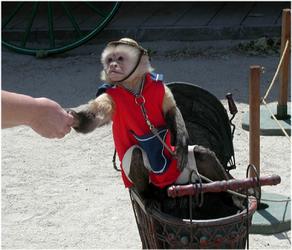 One of the best demonstrations of economics I've gotten, I got from ... a monkey. It was a little monkey at City Walk by Universal Studios in L.A. It had its owner with it, who was playing an old-fashioned organ where you grind the handle and it plays a corny old tune. The monkey was dressed in a silly costume, and there was a sign presenting the simple business proposition: Get out a quarter and the monkey will come over and get it out of your hand. Get out a dollar bill and the monkey will not only come and get it, but he will also shake your hand. Which is all cute, and well worth a quarter or a dollar, just to see that the monkey knows how to get the money, and to feel that it actually shakes your hand. I got out a dollar. The monkey snapped it up, shook my hand, and moved on to other businesss. Not so much as a smile, but I still felt satisfied with the transaction. One of the best demonstrations of economics I've gotten, I got from ... a monkey. It was a little monkey at City Walk by Universal Studios in L.A. It had its owner with it, who was playing an old-fashioned organ where you grind the handle and it plays a corny old tune. The monkey was dressed in a silly costume, and there was a sign presenting the simple business proposition: Get out a quarter and the monkey will come over and get it out of your hand. Get out a dollar bill and the monkey will not only come and get it, but he will also shake your hand. Which is all cute, and well worth a quarter or a dollar, just to see that the monkey knows how to get the money, and to feel that it actually shakes your hand. I got out a dollar. The monkey snapped it up, shook my hand, and moved on to other businesss. Not so much as a smile, but I still felt satisfied with the transaction.
But now, the remarkable business action going on becomes apparent from observing that there's continuously 50 to 100 people standing around, and the monkey is essentially running around as fast as it can, picking up dollar bills and shaking hands. Seemed like 10-20 customers per minute to me. And, well, despite that I'm no business genius, I can easily add that up to $600-1200 per hour. Indeed, the organ grinder had a a rather large box that all the money was dropped into, and it was running over when I saw it.
I was sort of stunned. But that is a money machine at its best. Once you've trained the monkey, it takes very little effort, brings in loads of cash, and all the customers are happy with the transaction. The monkey works for peanuts, but I'm sure he's happy too.
I have peanuts. I have a roomy bucket that will hold a lot of money. But where do I get a monkey?
[ Organization | 2003-09-12 09:05 | | PermaLink ] More >
|
|
<< Newer stories Page: 1 2 3 4 5 6 7 8 Older stories >> |

